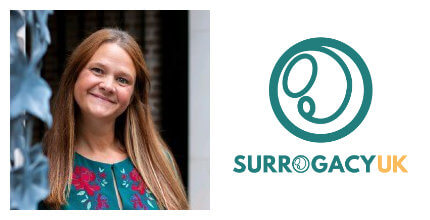National Surrogacy Week runs from 1 to 7 August 2023. It is now in its fifth year, having been started in 2019 with the multiple aims of not only raising awareness of UK surrogacy, but also educating the public on it and as a way to celebrate good practice in the area. This year’s theme for the week is “surrogacy stories”.
When it comes to personal and professional experience with surrogacy journeys, there are few within the surrogacy network who have as much experience as Sarah Taylor Jones, CEO of Surrogacy UK and National Surrogacy Award 2023 nominee for her Outstanding Contribution to Surrogacy. Surrogacy UK is the UK’s leading not-for-profit surrogacy organisation, assisting surrogates and intended parents with all aspects of their surrogacy journey. Sarah Taylor Jones started her unique relationship with surrogacy over 20 years ago when she began volunteering with Surrogacy UK as a peer supporter, then becoming a trustee for the charity and eventually becoming their CEO. As well as being a surrogate five times herself during that period, Sarah Taylor Jones has helped Surrogacy UK grow to become the UK’s leading not-for-profit surrogacy organisation and assisted the growth of thousands of families across the UK.

Sarah Taylor Jones, CEO of Surrogacy UK
As part of National Surrogacy Week 2023, Sarah Taylor Jones kindly agreed to discuss her own first-hand experiences with surrogacy, her views of the current laws and the proposals for reform with Charlie Geyton, Trainee Solicitor in Winckworth Sherwood’s Family Team.
WS: What encouraged you to be part of the expanding surrogacy network? How did you become a surrogate initially?
STJ: I was looking at doing either egg donation or surrogacy and through my research found Surrogacy UK, which had only started a few months earlier. Surrogacy UK focus on maintaining the relationship with the surrogate as the child grows up and encourage the surrogate to be part of the child’s life, which was exactly what I was looking for.
Surrogacy UK organise socials for surrogates to meet intended parents. When I first joined the organisation, I attended one of these socials and met my first intended parents and it all stemmed from there.
After my second surrogacy, I met my husband. He had been involved in my past surrogacy journeys as he met the children I had carried and had seen how those experiences had enriched my life and, as a result, his life. He could tell I wanted to do more, so actively helped me to find future intended parents.
WS: It is great that you had such a supportive partner. As you know, with the law in its current form, the surrogate’s spouse automatically becomes the child’s parent from birth. How important is it to Surrogacy UK for the surrogate’s partner to be involved in the process?
STJ: We put a lot of emphasis on ensuring that the surrogate’s partner is supportive of the surrogate’s journey. At our conferences, we have a surrogate partner workshop. We find that facilitating conversations for surrogate partners can really help them come to terms with their partner’s decision and voice their concerns in an open and non-judgmental space.
The law in its current form not only raises issues for partners who are together, but it can cause even more issues where the surrogate is separated from her spouse (before they have obtained a divorce). This is a particular problem where the surrogate is required to undergo IVF, as she will be required to obtain her spouse’s consent, even if the couple are separated. The spouse will need to show that he knows the law, has received counselling and given his fully informed consent for the surrogate to undergo treatment. This high bar for consent disincentivises surrogate partners from consenting to the process and stops potential surrogates from helping families.
Unfortunately, we have seen occasions where the husband has exercised coercive control during the relationship and withholds their consent as another way of controlling their ex. We would rather there was a presumption of consent, and the spouse could then withdraw their consent if they did not agree to the IVF treatment.
WS: That must be so difficult, and something I am sure many people would not have considered being a pitfall in the law. Surrogacy can be an emotive subject that catches people’s attention which can lead to people having polarised views, without having all the information. From your experience, what is the most common misconception about surrogacy?
STJ: The biggest misconception is that surrogates have to be surrogates. People seem to think that a surrogate is low income so therefore heavily incentivised by money and is forced or coerced into it. But, in the UK, surrogates tend to give the same justification for undertaking surrogacy: they want to help a couple who cannot conceive. This stigma can dissuade potential surrogates, which in turn affects potential families.
It is important that this stigma is addressed, along with the stigma against pregnancy in the workplace. If employers are not willing to accommodate women having IVF or pregnancies, then it can preclude women in professional careers from becoming surrogates. If required to use IVF for the surrogacy, it can be the unseen part of the surrogacy and can take around 2 years before the surrogate even becomes pregnant. IVF can be physically, financially, and emotionally exhausting. Even if the surrogate is receiving reasonable expenses, she may not be receiving the expenses for her IVF treatment, but it can involve many hospital trips and medical tests. If her job cannot accommodate the treatment, she would not be financially able to continue with her surrogacy journey.
WS: The law has its role to play its part in diminishing this stigma. What are your views of the current laws on surrogacy?
STJ: The current legal framework tries to protect what it thinks needs protecting but fails in protecting any of the parties to the surrogacy. The laws are designed to allow the surrogate to change her mind following the birth, but a large majority of surrogates say that is not an important factor for them. The law assumes that the women will be overcome with emotion and change her mind as soon as she sees the baby. It takes a long time for the surrogate and the parents to get to the point of having the child; the surrogate goes into the pregnancy with a clear idea of what will happen to the child when it is born.
The current law is not fit for purpose. It was a knee-jerk reaction to something that happened 30 years ago and is not reflective of current processes. The law does not protect anyone involved in the surrogacy journey, so we heavily campaigned for reform.
WS: What are your views of the Law Commission’s reforms, as both a surrogate yourself and in your position at the head of a surrogacy organisation?
STJ: The consultation was very broad, and we were impressed to see that surrogates’ voices were being considered, because their voice can sometimes be the quietest. The surrogates’ needs have not been listened to throughout the current legal regime, but they are usually the most important person in the surrogacy relationship.
The main priority for surrogates is that they do not want to be responsible for the children they are carrying. Most people worry that the surrogate will run off with the baby, but the surrogate is worried they will be stuck with a child they had no intention of conceiving themselves. At the moment, there are no laws to say the intended parents are responsible until the parental order is sealed after the baby is born. There is nothing compelling them to get the parental order once the baby arrives and the court procedures can mean that intended parents do not obtain parental responsibility for months. The reforms seek to ensure that the intended parents become the parents at birth.
But as an organisation, the most important thing for us is regulation. Surrogacy organisations are currently self-regulated, which has been largely successful. However, there needs to be an independent regulator that puts the necessary safeguards in place, before the baby is conceived, as opposed to after it is born (as with the current system) which I think is far too late.
WS: Which of the reforms do you think is the most important, and why?
STJ: I think it is the surrogacy register which allows the child to access information about their genetic parents, at an appropriate age. Across the UK, transparency has always been key. The rule is that the child almost always has some type of relationship or at least information about the surrogate. But the surrogacy register will ensure the details are available to the child when they want to find out more information about their birth. The adults are the ones who make all the decisions before its born; it is important to allow the child to find out this information, so they can make some of their own decisions about their birth as well.
Winckworth Sherwood would like to warmly thank Sarah Taylor Jones for making the time for this interview and providing us with her insight on this very important issue.
If you had any questions about any of the points raised in this interview, you can contact the Family Team at Winckworth Sherwood who would be delighted to assist. If you wanted to find out more about Surrogacy UK, you can contact them via their website.



